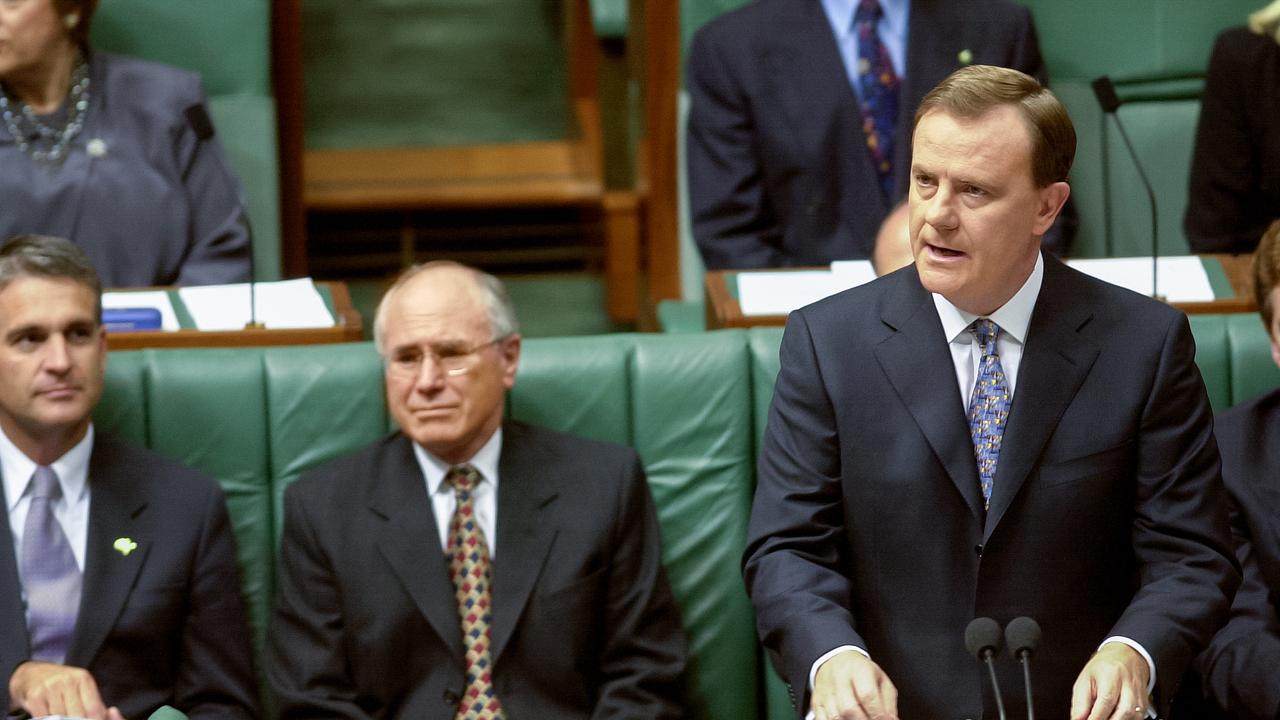Albanese government shows its true character in budget blowout
- 5:00AM MAY 16, 2024
- COMMENTS
Federal budgets are more than numbers; they reveal the character of a government and this week’s effort confirms that Anthony Albanese is running the most green-left government we’ve ever had, with more handouts, more debt and more picking winners.
On top of epic incompetence in immigration and border protection, workplace changes to buy off the unions, the failed attempt to entrench racial difference in our Constitution via the voice proposal and the broken promises on tax and superannuation, now gone is any pretence at budget responsibility.
With the terms of trade at a once-in-a-century high and unemployment at a once-in-a-half-century low, the budget should be in massive surplus.
Instead there’s a wafer-thin $9bn surplus, largely on the back of fossil fuel exports that the government wants to stop, to be followed by a long run of deficits of between 1 per cent and 2 per cent of GDP based on extra baked-in spending of $315bn largely on the so-called care economy.
Plus there’s $80bn in off-budget spending (for student loans, low-income housing and more green projects such as another $7bn for Snowy Hydro).
Federal budget lacks ‘vision and ambition’ for future of Australia
Labor’s federal budget lacks “vision and ambition” for the future of Australia as the country suffers through large… economic problems, according to Institute of Public Affairs’ Daniel Wild. “What this also reinforces is this is a redistributionist government, it is not a growth government,” Mr Wild told Sky NewsMoreBut even with so much spending off-budget, net debt is still expected to grow by another $200bn across the next five years.
READ MORE:Quite apart from the fact it needs continued high immigration to pump up the overall economic growth numbers and avoid a technical recession|It’s now a decade since the last budget that attempted any serious economic reform, when the Coalition tried to roll back entitlements and cut government spending.|As always, Labor thinks government is much smarter at spending taxpayers’ money than we are ourselves.|The five budget charts and data you need to see|All the old budget rules – such as keeping tax under a certain percentage of GDP, capping growth in spending and insisting that new spending is offset by savings – that helped Peter Costello deliver 10 straight surpluses and Paul Keating to deliver four have been scrapped in favour of creative accounting that dresses up spending as investment.
This budget conclusively proves that Labor monumentally fails to grasp that government can’t spend a dollar that it doesn’t get from taxpayers, either in taxes now or in taxes tomorrow to pay for today’s debt.As always, Labor thinks government is much smarter at spending taxpayers’ money than we are ourselves.
All the average Australian will gain from this budget that’s new is the non-means-tested $300 electricity bill handout that won’t nearly compensate for the climate-policy-driven leap in costs; and for low-income renters, some extra help that won’t nearly compensate for the immigration and interest-rate-driven rise in housing costs.
And even these are essentially the government putting in one pocket money that it has taken out of the other. What this budget will mean for all of us is a long-term weaker economy with bigger government, lower productivity and more green protectionism.
The only real surprise in the budget was the brazenness with which Jim Chalmers abandoned any fidelity to the fiscally responsible pro-market legacy of Keating and Bob Hawke, to trumpet the virtues of green interventionism.
The relentless boosterism of the federal Treasurer sits uneasily with the fact Australians, struggling with mortgage repayments that have doubled, don’t feel Labor has helped them and they are starting to notice that GDP per person has fallen for four straight quarters – meaning that whatever the headline numbers say, ordinary families are already in deep recession.
Very few economists accept the government’s spin that its energy and housing handouts will reduce inflation. Even if the handouts temporarily mask some policy-driven cost increases, struggling families are much more likely to spend on other necessities than to keep the money in their pockets. Hence the overall inflationary pressures that so worry the Reserve Bank and have led to the sustained rise in interest rates, which might even increase again.
The budget has only intensified the paradox of the Reserve Bank tapping the economic brakes while the government presses the accelerator; so, with some economists now tipping more interest rate rises, it seems undeniable that the biggest impact of the budget will be to keep interest rates higher for longer, with even the government’s own budget papers forecasting no drop in the cash rate before the middle of next year.
What was needed in this budget was a short-term focus on beating inflation, a medium-term focus on controlling government spending and a longer-term focus on making our economy more productive. In failing on all three counts, the government has let our country down badly.
As well as permanently higher wages for aged-care and childcare workers (as if the government should be meeting the wage costs of mostly private sector workers), there has been no serious attempt to rein in skyrocketing National Disability Insurance Scheme costs other than by funding the states to stop cost-shifting on to the commonwealth. And it’s far from clear that the government is serious about big cuts to immigration.
Quite apart from the fact it needs continued high immigration to pump up the overall economic growth numbers and avoid a technical recession, and even on its own figures still expects to keep immigration at double the average of the Howard years, there’s as yet no specificity about how it will cap overseas student numbers or require educational institutions to house the students they import.
But this has become a characteristic of this government: to declare an objective without any detail about its implementation and then to act as though wishing it has made it happen.
Given the woke obsessions of our universities, is the government’s announced objective to graduate eight out of 10 Australians by 2050 likely to make us more productive, as opposed to more likely to vote green left?
Then there’s some $23bn in various Future Made in Australia programs designed to make us a renewable energy superpower because, the Treasurer insists, the “world is committed to net zero”. Even though China and India are not – or at least not nearly as quickly or as convulsively as we are.
It doesn’t matter how often the government asserts it, the notion that Australia has a comparative advantage here, as if other countries don’t have wind and sunlight, hardly stands scrutiny.
There may be a case for some assistance to the strategic minerals that more battery making will require, especially given China’s attempt to corner this market, but it’s hard to credit that we should invest massively in “green hydrogen” that’s completely unproven at scale or that we can out-subsidise the US or the EU. Given that the big players in these industries include billionaires such as Andrew Forrest, why is the government relieving them of the need to commit more of their own money? Why is Labor bankrolling billionaires but making ordinary families scrimp and save?
It’s now a decade since the last budget that attempted any serious economic reform, when the Coalition tried to roll back entitlements and cut government spending.Instead, what we have now is a budget where government spending, as a share of the economy, is forecast to rise to its highest levels, outside the pandemic, in almost 40 years.
With no obvious cuts to anything and an abundance of giveaways, this one has the feel of a pre-election budget. Perhaps backed with more wall-to-wall government advertising, it might be enough to anaesthetise voters. But if the government does run to a premature election before the end of the year, it will expose its fear that the overall economy is going to get worse.
COLUMNISTPeta Credlin AO is a weekly columnist with The Australian, and also with News Corp Australia's Sunday mastheads, including The Sunday Telegraph and Sunday Herald Sun. Since 2017 she has hosted her successful prime...Read more
A NOTE ABOUT RELEVANT ADVERTISING: We collect information about the content (including ads) you use across this site and use it to make both advertising and content more relevant to you on our network and other sites. This is also known as Online Behavioural Advertising. You canfind out more about our policy and your choices, including how to opt-out here.Back to topMore fromThe Australian
Copyright Nationwide News Pty Ltd. All times AEST (GMT +10:00)
Powered by WordPress.com VIP
×
- Forums
- ASX - By Stock
- XJO
- 13/05 Indices
13/05 Indices, page-19
-
-
- There are more pages in this discussion • 32 more messages in this thread...
You’re viewing a single post only. To view the entire thread just sign in or Join Now (FREE)
Featured News
Add XJO (ASX) to my watchlist
 (20min delay) (20min delay)
|
|||||
|
Last
7,971.6 |
Change
-64.900(0.81%) |
Mkt cap ! n/a | |||
| Open | High | Low |
| 8,036.5 | 8,036.5 | 7,923.6 |
Featured News
| XJO (ASX) Chart |
 Federal Treasurer Jim Chalmers during Question Time at Parliament House in Canberra. Picture: NCA NewsWire / Martin Ollman
Federal Treasurer Jim Chalmers during Question Time at Parliament House in Canberra. Picture: NCA NewsWire / Martin Ollman
 Bob Hawke and Paul Keating addresses the premiers conference in Parliament House.
Bob Hawke and Paul Keating addresses the premiers conference in Parliament House. Treasurer Peter Costello delivering the Budget speech in the House of Representatives.
Treasurer Peter Costello delivering the Budget speech in the House of Representatives.









